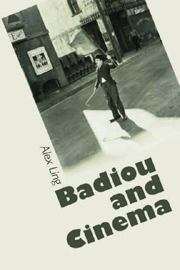Book contents
- Frontmatter
- Contents
- Acknowledgements
- Abbreviations of Frequently Cited Texts
- Introduction: Gorky's Maxim
- 1 Presenting Alain Badiou
- 2 Can Cinema be Thought?
- 3 In the Kingdom of Shadows
- 4 An Aesthetic of Truth
- 5 An Instant or an Eternity: Thinking Cinema After Deleuze
- 6 Alain Resnais and the Mise en Scène of Two
- 7 The Castle of Impurity
- Conclusion: The Future of an Illusion
- Bibliography
- Filmography
- Index
2 - Can Cinema be Thought?
Published online by Cambridge University Press: 12 September 2012
- Frontmatter
- Contents
- Acknowledgements
- Abbreviations of Frequently Cited Texts
- Introduction: Gorky's Maxim
- 1 Presenting Alain Badiou
- 2 Can Cinema be Thought?
- 3 In the Kingdom of Shadows
- 4 An Aesthetic of Truth
- 5 An Instant or an Eternity: Thinking Cinema After Deleuze
- 6 Alain Resnais and the Mise en Scène of Two
- 7 The Castle of Impurity
- Conclusion: The Future of an Illusion
- Bibliography
- Filmography
- Index
Summary
Formalization is our goal, our ideal.
Jacques LacanParasitic cinema
Now, it is necessary to ask of the cinematograph, is it to be accepted within the confines of art?
Ricciotto CanudoIf we focus solely on the smattering of Badiou's ‘inaesthetic’ papers on cinema that have thus far made their way into English, then we would be forgiven for concluding that, at least at first glance, far from serving to condition his philosophy, cinema is of little consequence to Badiou. Indeed, on a superficial reading his best known musings on film – namely, the chapter in his Handbook of Inaesthetics on ‘The False Movements of Cinema’ (comprising two earlier papers first published in L'art du cinéma) and his essay on ‘Philosophy and Cinema’ found in the collection Infinite Thought (also originally published in L'art du cinéma) – do not appear all that encouraging, especially when placed alongside his decidedly more exuberant writings on poetry, theatre, music and the like. For one thing, Badiou's liberal use of the words ‘contaminated’, ‘parasitic’ and ‘inconsistent’ in his description of cinema seem rather less than inspiring. Nonetheless, as this book will argue (in a manner perfectly befitting the art of cinema), appearances can be deceiving.
In point of fact, Badiou's interest in cinema stretches back quite a way. One need only note that in 1993 Badiou, together with Denis Lévy, founded (and remains a regular contributor to) the review L'art du cinéma.
- Type
- Chapter
- Information
- Badiou and Cinema , pp. 32 - 54Publisher: Edinburgh University PressPrint publication year: 2010



